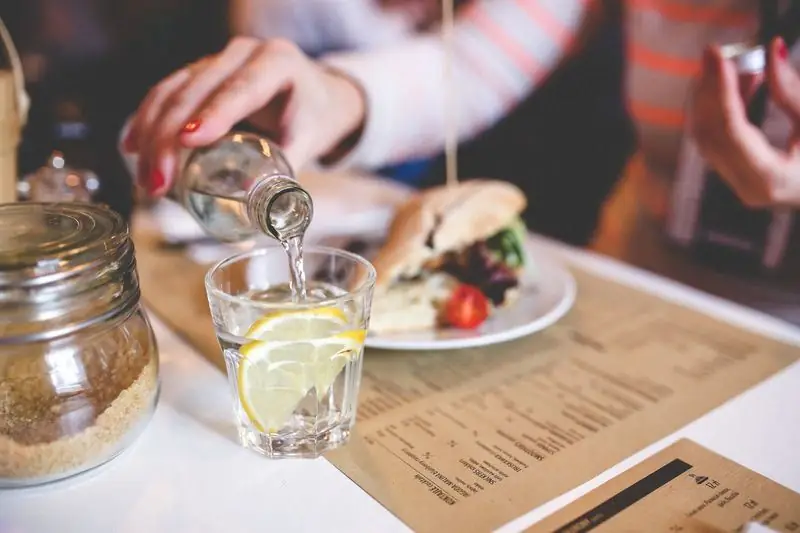
Table of contents:
- Author Bailey Albertson albertson@usefultipsdiy.com.
- Public 2023-12-17 12:53.
- Last modified 2025-06-01 07:32.
Alcohol and antibiotics: to drink or not to drink?

Doctors advise avoiding alcohol consumption in parallel with taking many medications. Many drug instructions say in black and white “incompatible with alcoholic beverages”. The combination of alcohol and antibiotics is considered especially dangerous. But what exactly does this combination threaten and does the ban apply to all antibacterial agents without exception?
The incompatibility of alcohol and antibiotics - myth or reality?
During any treatment and if you feel unwell, it is wise to stop drinking alcohol. While alcohol alone does not reduce the effectiveness of most antibiotics, as many are accustomed to think, drinking alcohol, especially in excessive amounts, dramatically increases the chances of developing side effects and slows down the healing process.
In general, drinking any amount of alcohol while fighting an infection may be unwise, as it leads to dehydration, interruptions in normal sleep, and can interfere with the body's natural ability to heal itself. In addition, some antibiotics have specific and sometimes very dangerous interactions with alcohol.
The effect of alcohol on the body's ability to fight infection
Compliance with the daily regimen, rest and good nutrition are factors that help a sick body recover from inflammation or infection. Drinking alcohol reduces the body's ability to resist infection and can negate all efforts to recover. The negative effects of alcoholic beverages include:
- sleep disturbances, which interfere with the body's natural ability to heal itself;
- deterioration in the absorption of vital nutrients, which our body especially needs during illness;
- exerting a significant load on the liver, whose work is already complicated by taking medication;
- increased blood sugar and decreased energy levels needed to fight infection;
- dehydration.

The general negative effect of alcohol on the body slows down the healing process and increases the side effects of antibiotics
It should be borne in mind that alcohol does not only mean a glass of beer, wine, a glass of liqueur or a cocktail. Alcohol can be present in some mouth rinses and cold medications. Before using these products during the course of antibiotic therapy, you must carefully read the list of ingredients. The course of treatment most often lasts no longer than 1-2 weeks, so refraining from foods containing alcohol is not too tiring.
Negative consequences
Drinking alcohol in moderation is unlikely to cause serious problems with most common antibiotics. But there are also such drugs, in the treatment of which alcohol is categorically contraindicated, since together they cause a reaction of acute intoxication:
-
Metronidazole - most often used in the fight against dental or vaginal infections;

Metronidazole The simultaneous intake of Metronidazole and alcohol triggers the so-called antabuse reaction (acute intoxication)
- Tinidazole - Traditionally used against colonization of the stomach by bacteria of the genus Helicobacter pylori (H. pylori).
Side effects of combining these drugs with alcohol include:
- bad state of health;
- pain in the abdomen;
- tachycardia or arrhythmia;
- headaches and dizziness;
- a feeling of heat in the face and neck;
- drowsiness.
Alcohol should not be consumed for at least 48 hours after the end of treatment with Metronidazole and for about 72 hours after the termination of Tinidazole.
There is a list of antibiotics that can sometimes interact with alcohol, for example:
- Linezolid - May interact with alcoholic fermented beverages, including wine, beer, sherry;
- Doxycycline - when interacting with alcohol, it partially loses its therapeutic effect.
Antibiotics often have many side effects. Feeling unwell, drowsiness, dizziness - the negative effects of drugs will multiply several times under the influence of a glass of wine or a bottle of beer.
Alcohol and antibiotics: video
If you have doubts about drinking even a small amount of alcohol during the course of antibiotic therapy, it is always wise to consult your doctor once again. If the instructions for the drug say that alcohol is contraindicated during treatment, strictly follow this prohibition.
Recommended:
Why Adults Shouldn't Drink Milk: Truth Or Myth

Can adults drink milk and consume dairy products? The benefits and harms of drinking milk for an adult
Why You Shouldn't Drink Right After Meals, Including Water And Tea

Is it possible to drink after eating, than it threatens. How and after what time can you drink food without harm to health
Why You Can't Why You Can't Wash Floors On Friday: Signs And Facts

Why you can't wash floors on Friday: signs and superstitions. The opinion of the mystics and Orthodoxy
Why You Shouldn't Leave Dirty Dishes Overnight

Why is it considered that you should not leave dirty dishes in the sink overnight. Does superstition have rational roots
Why Shouldn't Men Drink Mint Tea?

Is mint tea dangerous for the male body? What is the risk of increased consumption of mint tea and how to avoid side effects
